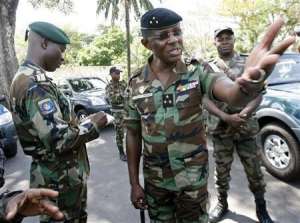
Ivorian President Laurent Gbagbo's army chief has sought refuge at the home of South Africa's ambassador in Abidjan, South Africa's foreign ministry says.
Phillippe Mangou was accompanied by his wife and children, a statement said.
The news came as forces loyal to the UN-recognised president, Alassane Ouattara, were reported to be on the outskirts of the main city of Abidjan.
Mr Gbagbo continues to cling to power in Abidjan, despite the UN saying he lost November's poll.
In a televised address, Mr Ouattara has called on government soldiers to join his forces.
Fighters loyal to Mr Ouattara began their advance south from their northern bases on Monday, capturing the capital, Yamoussoukro, and the key port of San Pedro on Wednesday.
The BBC's John James in Yamoussoukro says almost the only area President Gbagbo still controls is Abidjan - 240km (150 miles) to the south of the capital.
Mr Gbagbo's home town of Gagnoa has also fallen.
Since the crisis began in December, one million people have fled the violence - mostly from Abidjan - and at least 473 people have been killed, according to the UN.
Prison break
South Africa's Department of International Relations said Gen Mangou arrived at their ambassador's official residence in Abidjan with his family on Wednesday night.
"The South African government is in consultation with the relevant parties in the Ivory Coast, Economic Community of West African States, the African Union and the United Nations regarding this matter," the statement said.
According to the AFP news agency, Gen Mangou fled a day after state television read out a statement from him urging Mr Gbagbo's supporters to enlist in the army if they are "willing to die for their country".
On Wednesday, the UN Security Council voted to impose sanctions on Mr Gbagbo's circle, adding to economic measures already taken by the EU and African groups.
The UN resolution, drafted by France and Nigeria, imposes a travel ban and assets freeze on Mr Gbagbo, his wife Simone and three of his closest associates.
Residents on the outskirts of Abidjan report heavy fighting around the entry to the city on Thursday morning.
Our correspondent says there are several reports that the main prison has been broken into and the prisoners set free.
Checkpoint killings
| Ivory Coast: Battle for power |
|
The US-based rights group has documented the massacre of at least 37 foreign workers in a small village in the west, after forces loyal to Mr Ouattara passed through on their advance south.
"As they were killing people, they accused us of being rebels… They said other things in English that I couldn't understand," a 34-year-old man from Burkina Faso told the group's researchers.
"I saw 25 people killed with my own eyes. They killed women, with children, with men."
There are approximately five million expatriate workers in Ivory Coast from neighbouring countries, who came to work on cocoa farms and tropical fruit plantations in what used to be the region's economic powerhouse.
West Africans are also being targeted in Abidjan, some at checkpoints, others house-to-house, Human Rights Watch says.
One witness in Abidjan described an incident on Wednesday:
"At noon, the militiamen stopped a pick-up truck and asked the driver and his apprentice for their ID papers. The driver was told to go ahead, but they pulled the apprentice out of the passenger seat and fired four times at him. His body is still in the street.
"This is their way of targeting foreigners… they judge your background from your ID papers."
Armed men supporting Mr Ouattara had also been killing pro-Gbagbo fighters and supporters, the Human Rights Watch statement said.
The pro-Ouattara forces have controlled the north of the country since a 2002 civil war.
Pro-Gbagbo troops have lost every battle against them since last November's election, our reporter says.
The election was intended to reunify the country.





 SSNIT must be managed without gov’t interference – Austin Gamey
SSNIT must be managed without gov’t interference – Austin Gamey
 Ejisu by-election could go either way between NPP and independent candidate — Gl...
Ejisu by-election could go either way between NPP and independent candidate — Gl...
 We never asked ministers, DCEs to bring NPP apparatchiks for returning officer r...
We never asked ministers, DCEs to bring NPP apparatchiks for returning officer r...
 No one denigrated the commission when you appointed NDC sympathizers during your...
No one denigrated the commission when you appointed NDC sympathizers during your...
 Used cloth dealers protests over delayed Kumasi Central Market project
Used cloth dealers protests over delayed Kumasi Central Market project
 A/R: Kwadaso onion market traders refuse to relocate to new site
A/R: Kwadaso onion market traders refuse to relocate to new site
 Dumsor: Corn mill operators at Kaneshie market face financial crisis
Dumsor: Corn mill operators at Kaneshie market face financial crisis
 Jamestown fishermen seek support over destruction of canoes by Tuesday's heavy d...
Jamestown fishermen seek support over destruction of canoes by Tuesday's heavy d...
 Election 2024: EC to commence voter registration exercise on May 7
Election 2024: EC to commence voter registration exercise on May 7
 Western Region: GWL hopeful of restoration of water today in Sekondi-Takoradi
Western Region: GWL hopeful of restoration of water today in Sekondi-Takoradi
